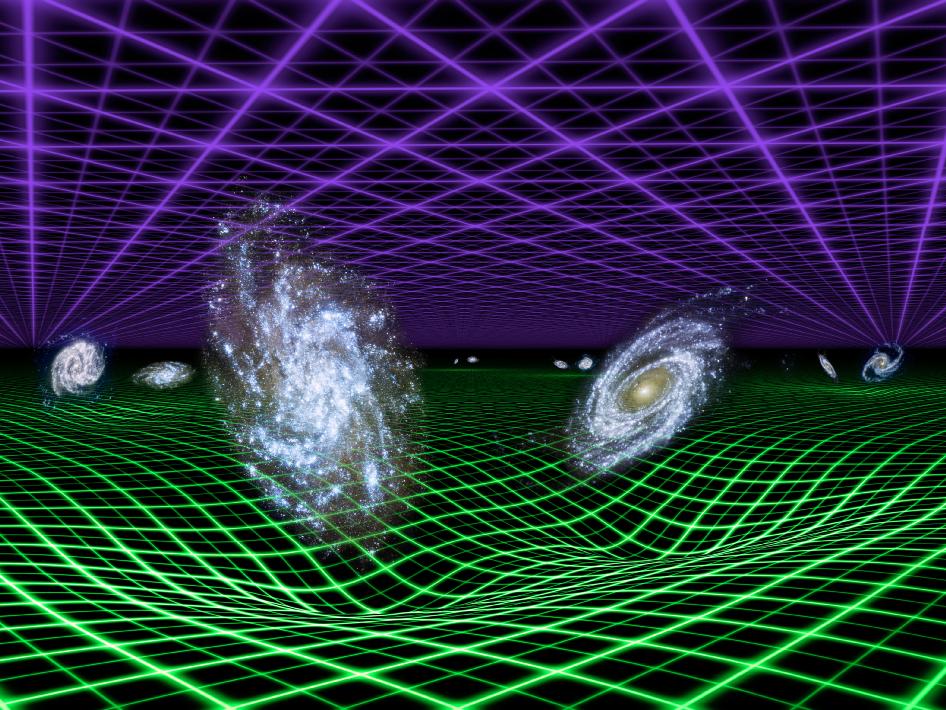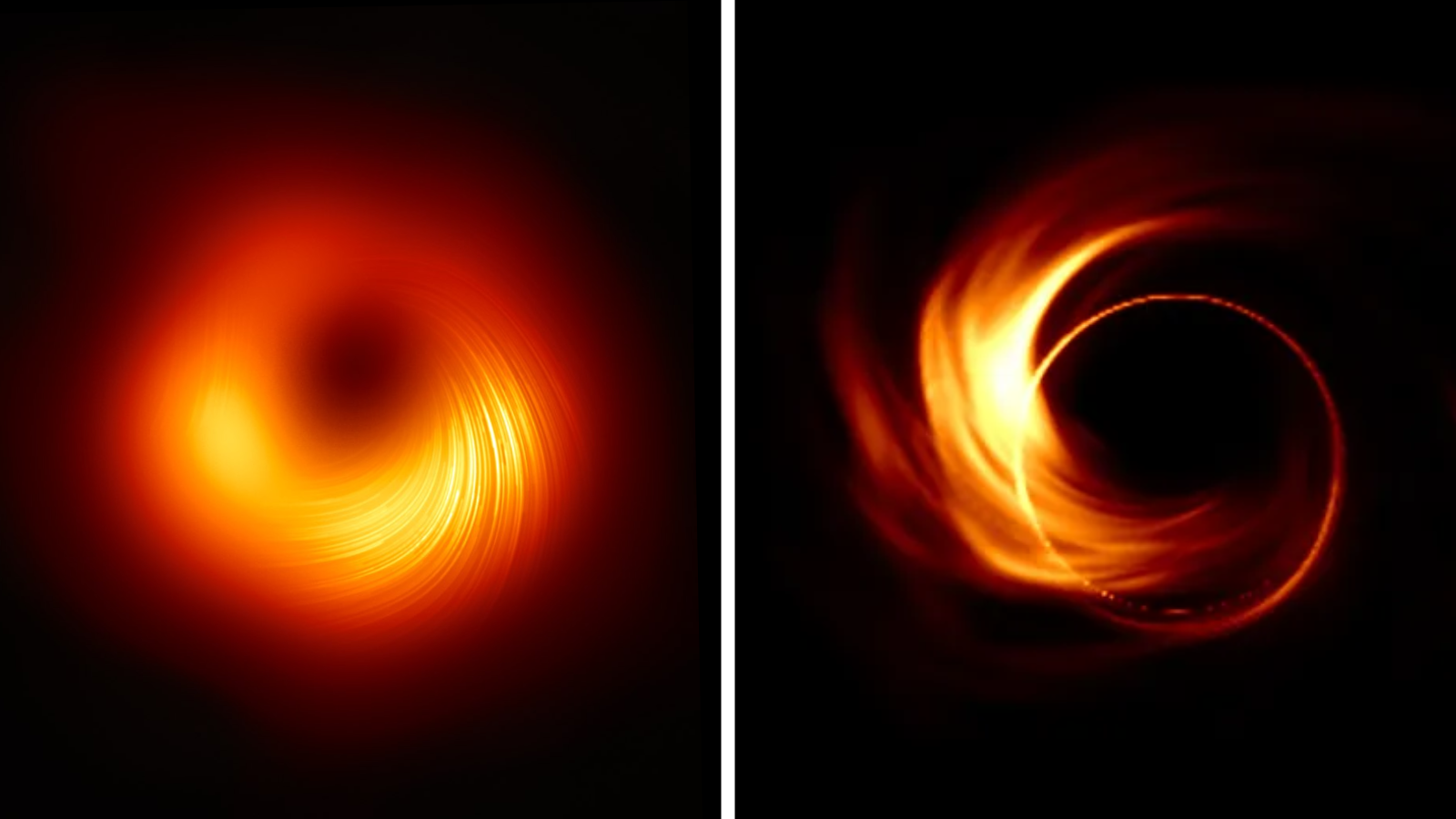Does a cosmic 'glitch' in gravity challenge Albert Einstein's greatest theory?
There is no denying the awesome predictive power of Albert Einstein’s 1915 theory of gravity, general relativity — yet, the theory still has inconsistencies when it comes to calculating its effect on vast distances. And new research suggests these inconsistencies could be the result of a “cosmic glitch” in gravity itself.
In the 109 years since it was first formulated, general relativity has remained our finest description of gravity on a galactic scale; time and again, experiments have confirmed its accuracy. This theory has also been used to predict aspects of the universe that would later be observationally confirmed. This includes the Big Bang, the existence of black holes, the gravitational lensing of light and tiny ripples in spacetime called gravitational waves.
Yet, like the Newtonian theory of gravity that it surpassed, general relativity may not offer us the full picture of this enigmatic force.
“This model of gravity has been essential for everything from theorizing the Big Bang to photographing black holes,” Robin Wen of the University of Waterloo’s Mathematical Physics Orogram said in a statement. “But when we try to understand gravity on a cosmic scale, at the scale of galaxy clusters and beyond, we encounter apparent inconsistencies with the predictions of general relativity.”
“Gravity becomes around one percent weaker when dealing with distances in the billions of light years,” Wen said. “We are calling this inconsistency a ‘cosmic glitch.’ It’s almost as if gravity itself stops perfectly matching Einstein’s theory.”
The cosmic glitch described by the team would require an alteration in a value called the gravitational constant. This alteration would occur as calculations approach the “superhorizon,” or the maximum distance light could have traveled since the origin of the universe.
This adjustment can be done, the team says, by adding a single extension to the standard cosmological model. This model is known as the lambda cold dark matter model. Once complete, the admendment should clear up inconsistencies in measurements at cosmological scales without affecting the existing successful uses of general relativity.
What is general relativity and could it be wrong?
The discovery of general relativity was so revolutionary because, rather than describe gravity as a mysterious force, it posited that gravity arises from the curvature of the very fabric of space and time, united as a single entity called “spacetime.” And this curvature, Einstein realized, is shaped by objects with mass.
Imagine placing balls of increasing mass on a stretched rubber sheet. A tennis ball would cause a tiny, almost imperceptible dent; a cricket ball would create a more pronounced dent; and a bowling ball would spur a huge curve that likely draws anything else on the sheet toward it. It’s the same concept with objects in space, though the curvature of spacetime exists in four dimensions, so there are some quite key differences. Still, moons have less mass than planets, planets less than stars, and stars less than galaxies — thus, the gravitational influences of these celestial bodies increases respectively.
Einstein’s theory of gravity was like a successor to Newtonian theory, though the latter still serves quite well on terrestrial scales and is accurate enough to get rockets to the moon. Yet, Einstein’s theory could explain things that Newton’s could not, such as the quirky orbit of Mercury around the sun.
Newton wasn’t exactly wrong about gravity — he just wasn’t right on scales of planets, stars and galaxies.

Objects with mass, in this illustration galaxies, warp the very fabric of spacetime giving rise to gravity. (Image credit: NASA/JPL-Caltech)
Is general relativity wrong, though?
Well, probably not. As a theory, it has been too accurate in predicting aspects of the universe we didn’t know about. For instance, the first image of a black hole captured by the Event Horizon Telescope was revealed to the public in April 2019. This image was kind of shocking because of how closely the appearance of the supermassive black hole M87* resembled predictions of general relativity.
However, scientists are aware there are a few issues with general relativity that may require its eventual revision. For instance, the theory doesn’t unite with quantum mechanics; the best description we have of physics on fundamental levels smaller than the atom. That’s mainly because there is currently no quantum theory to describe gravity.
So, it seems that adjustments to general relativity at some stage to “extend” its reach to the smallest scales of the universe — and according to this team, the vastest scales — seem inevitable.
For decades, researchers have attempted to create a mathematical model that helps general relativity overcome its inconsistencies, and University of Waterloo applied mathematicians and astrophysicists have been deeply engaged in this quest.

(Left) observation of the black hole M87* in polarized light (right) a simulation of a black hole created using general relativity (Image credit: EHT collaboration)
Change general relativity? What!
If the idea of revising general relativity seems tantamount to heresy, consider that this wouldn’t be the first time that its related theories had to be adjusted.
Shortly after Einstein first introduced the theory, he and others expanded upon it to develop an equation to describe the state of the universe. As a result of general relativity, this equation predicted that the universe should be changing. The issue with this was the scientific consensus at the time said the universe was static. And, while Einstein was no stranger to throwing the status quo into flux, he happened to agree with this non-changing cosmic picture.
To ensure general relativity predicted a static universe, Einstein added a “fudge factor” that he later described as his “greatest blunder,” This is known as the cosmological constant, and is represented by the Greek letter lambda. The constant would be removed from thought when Edwin Hubble convinced Einstein that the universe is non-static. It’s expanding, he argued. And as far as we know today, Hubble was indeed correct.
Lambda, however, would actually make a comeback. It’d start serving a different function at the end of the 20th century, when astronomers discovered that not only is the universe expanding, but it is doing so at an accelerating rate.

An illustration of the cosmological constant (lambda) being discarded (or maybe rescued) from the cosmic dustbin. (Image credit: Robert Lea)
“Almost a century ago, astronomers discovered that our universe is expanding,” Niayesh Afsharid, a University of Waterloo professor of astrophysics and a researcher at the Perimeter Institute, said in the statement. “The farther away galaxies are, the faster they are moving, to the point that they seem to be moving at nearly the speed of light, the maximum allowed by Einstein’s theory. Our finding suggests that, on those very scales, Einstein’s theory may also be insufficient.”
The University of Waterloo team’s suggestion of a “cosmic glitch” modifies gravity at vast distances and extends Einstein’s mathematical formulas to tackle this while not “overthrowing” the theory.
“Think of it as being like a footnote to Einstein’s theory,” Wen said. “Once you reach a cosmic scale, terms and conditions apply.”
The researchers behind this cosmic glitch theory suggest that future observations of the large-scale structure of the universe and a universal “fossil” field of radiation called the cosmic microwave background (CMB) from an event that occurred shortly after the Big Bang could shed light on whether a cosmic glitch in gravity is responsible for current “cosmic tensions.”
This could include the reason that quantum theory gives a value for lambda that is a staggering factor of 10¹²¹ (10 followed by 120 zeroes) greater than astronomical observations seem to show (no wonder some physicists call it “the worst theoretical prediction in the history of physics!”).
“This new model might just be the first clue in a cosmic puzzle we are starting to solve across space and time,” Afshordi concluded.
The team research appears in the Journal of Cosmology and Astroparticle Physics.
